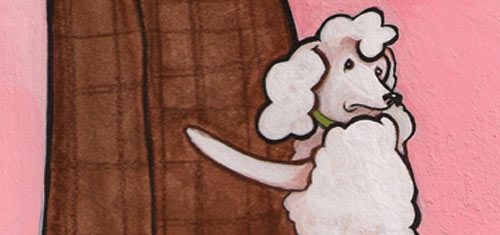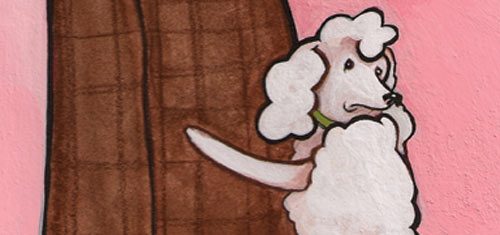

Healthy Affection vs. Obsession
Are you cultivating seperation anxiety
Loving your dog is great. Smothering her obsessively with your affections—not so much. What, you might ask, is the difference? Healthy love, in any relationship, includes wanting the “other” to be able to enjoy time apart. Do you like the prospect of your canine companion enjoying time away from you? Or are you unknowingly fostering dysfunctional overdependence? If your dog already has separation anxiety does that stroke your ego? Or does it concern you, leading you to seek help in fixing the problem?
Let’s first take a look at why separation anxiety is so common in pet dogs, and then run through a checklist to help you decide which you are nurturing: your dog, or a potential anxiety problem.
Why separation anxiety is so common
Dogs, as pack animals, are not genetically well-designed to spend long periods of time alone. Nature didn’t demand it from their ancestors, so the “I’m quite happy to pass the day by my lonesome” genes were not passed down to most of them. Combine this with our modern dog’s lifestyle that usually imposes times of solitude and presto: the common problem of separation anxiety. Given this mismatch between what dogs were designed for and what our lifestyle demands of them, we need to help them—from puppyhood through to sunset years—grow comfortable with alone time.
Promoting K9 mental health
Anxiety in dogs, as in people, is influenced by two main factors: genes and environment, also known as nature and nurture. Once a pup is conceived, we have no control over genetics, but we retain lots of influence over environment. Just as we humans tend to thrive best when our bodies and brains are well exercised and our social needs met, so do our canine companions. By gradually accustoming Fido to alone time right from the get-go, and then diligently providing a lifestyle that meets physical, intellectual, and social needs, we greatly reduce the likelihood of many psychological problems—anxiety included.
Prevention checklist for the ver-r-ry attached
Dedicated dog lovers sometimes fall into the trap of nurturing an anxiety problem by allowing their own emotional needs to interfere with what their dog needs for good mental health.
Could this be you? The following checklist will help you gauge whether your
well-intended affection might, in fact, be bordering on anxiety-nurturing obsession.
Are you and your dog joined at the hip?
Letting your dog get used to 24/7 companionship is a disaster in the making. You may be available round the clock today, but circumstances can change unexpectedly. Help your dog become comfortable spending time alone before it is ever a necessity. My favourite first step for alone training is to cultivate a jaws-ercise addiction. When your dog salivates at the prospect of a long luscious date with a favourite food-stuffed chew toy as you prepare to leave the house, you’ll know you won’t be too desperately missed!
Do you smother your dog with attention to alleviate “separation guilt?”
Lavishing your dog with continuous attention when together creates an unnecessarily BIG contrast effect when you are apart. The very behaviour that soothes your guilty conscience can hinder your dog’s healthy independence. Blur the difference between being home and away by making sure you aren’t always fawning over her, or always at her beck and call. A baby gate across the hallway while preparing a meal, or some time behind a closed door while online or buried in a good novel, will help reduce the contrast between your presence and your absence.
Can your dog sleep solo?
While there is absolutely NOTHING wrong with sharing the sofas and bed with your fur-friend, making sure she can get some shut eye in a portable doggie den is not cruel—it is simply good planning. You never know when she will need to spend the night without you at another home, the veterinary clinic, or a boarding facility. Being accustomed to sleeping alone in a crate or ex-pen can prevent a night apart from being traumatic and triggering separation anxiety.
Do you like seeing your dog immersed in an activity without you?
If the idea of your dog enjoying pastimes independent of you makes your heart ache, then you need to take a good long look in the mirror. Healthy guardianship includes both the gratification of being needed and the desire to enjoy occasions apart. Just as a well-adjusted parent delights over their child having a blast at sleepaway camp, a well-adjusted dog guardian relishes their dog’s ability to have a good time without them. If you find yourself compelled to vie for attention when your dog is merrily massacring a rawhide, strategizing over where to bury a bone, or just bumming around with a dog buddy, then your behaviour may be fueling an anxiety problem—in both of you.
Do you cultivate a healthy sense of security and stability in your dog?
Dogs suffering from separation anxiety make better progress in their training programs when a “nothing in life is free” rule is invoked: the dog has to comply with a request before being granted something he wants. Learning that there are predictable ways of manipulating their environment, such as being picked up by sitting on command, or getting to eat supper by staying “off” the dish until invited to “take it” probably decrease anxiety by building confidence and reducing feelings of helplessness. Structure such as this breeds a sense of security and stability. Give your dog the psychological benefits of structure before an anxiety problem develops: ask her to do more than just lap up your affection—teach her constructive ways of manipulating the world around her.
Avoiding the doggie shrink: key points to remember
Healthy affection is but one of the ingredients to keeping your dog off Prozac. Like us, dogs need much more than love for emotional wellness. Enabling your dog to pursue interests other than you—interests that provide physical, social, and intellectual stimulation—will ensure that being needed, a naturally gratifying part of guardianship, isn’t what defines the relationship. Remember, cultivating confidence and independence in your dog so that she can enjoy time apart from you is a sure sign of healthy love.
Join the newsletter and never miss out on dog content again!
"*" indicates required fields
By clicking the arrow, you agree to our web Terms of Use and Privacy & Cookie Policy. Easy unsubscribe links are provided in every email.